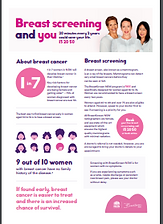Breast Health
Heading 1
Everybody has breasts; men, women and children. And though everyone can be presented with **breast health concerns, this page specifically covers 'cis' women’s breast health.
*'Cis' or 'Cisgender' is a term for people whose gender identity matches their sex assigned at birth.
Are my breasts normal?
Breasts can be big or small, firm or soft, lumpy or smooth. Most people have one breast bigger than the other. There is as much variation in breasts as there is in their owners.
Breast tissue changes in response to hormone levels. In a cis woman, these hormones cycle and change with her ovulation. Therefore the tissue (which is glandular and hormone-sensitive) will change throughout her cycle. Before puberty and after menopause, breast tissue is very different from that of breast tissue during a woman's reproductive life (i.e. childbearing years).
Breasts in a cis woman are designed to breastfeed a child. If she does not use them in this way, that's ok, however her breast tissue will still change in response to hormones, whether she uses hormones, such as the oral contraceptive pill, or has a natural cycle.
Women frequently complain of painful or lumpy breasts. It’s important to know what’s normal, so you know what is NOT normal for you. If you want a second opinion, or have any concerns, get in touch with our Sydney women's health clinic for a consultation.

You, as the owner of your breasts, are the best person to be able to notice a change. That means that you need to get familiar with your own breasts:
1. Look at your breasts in a mirror with good light.
2. Feel your breasts (breast self-examination)
Breast self-examination is best done in the shower or when you are lying flat. In the shower; use a soapy hand and keep your fingers flat to your chest. Start off with a circling motion around the outside of your breast and feeling with your flattened fingers in circles, move towards the middle and the nipple itself.
Breast self-examination will help you feel if there are any tender or lumpy aspects to the breast.
When should I see my doctor?
As the expert on your own breasts, you should see your doctor if you detect any worrisome changes such as;
-
a new lump (particularly if it is not tender) or new lumpiness (especially if its only in one breast).
-
a change in the size or shape of your breast
-
a change in the skin of your breast such as redness or dimpling
-
any changes in the nipple such as itchiness, scabbing or discharge
-
any persistent pain in your left or right breast.

Most changes are NOT due to breast cancer but it’s important to see your doctor without delay if you notice any of these changes.
What is breast screening and should I have it?

In Australia, women are invited to have a mammogram between the ages of 50-74, every two years. This is called “breast screening” and it is for women who have no breast symptoms ie no problems or abnormalities.
For women who do have symptoms, such as a lump, or nipple discharge, they may also undergo breast imaging. If you have symptoms, the imaging that your doctor will request will depend on what it is you have. Your doctor may request an ultrasound or MRI scan, or ultrasound-guided biopsy.
I have breast implants; does that matter?
Cosmetic breast surgery is very popular in Australia. While there is no clear evidence that breast implants increase the risk of cancer, it may be more difficult to investigate a lump in women who have breast implants.
Women who have breast implants are still able to have screening mammograms but you need to inform your mammographer that you have them.

Does hormone therapy increase the risk of breast cancer?

This question has been the subject of much research and controversy. Over the years there have been studies published, which link hormone therapy to breast cancer. Hormone therapies include the oral contraceptive pill and menopausal hormone treatment.
However, conclusive evidence for hormones causing breast cancer, in whatever form ( ie pills, patches implants ) is lacking. There is no robust data that links the oral contraceptive pill or using menopausal hormone therapy to breast cancer. Some studies have been published which suggest a link between hormones and breast cancer, but “gold standard” evidence is lacking. This is because it is difficult to prove “cause and effect” and large scale studies using the correct design are necessary.
This is a disputed area and it is worth noting that different clinicians may interpret the medical evidence differently. Different doctors may provide you with different advice depending on how they interpret the evidence. Here at Clinic 66, we use the best evidence available to guide our decision making and patient care.
**Note; cis and trans men can get breast cancer, children can get breast enlargement and trans women can experience breast problems as a result of hormone and surgical treatment to enhance breast tissue. (These issues are beyond the scope of this web page. Please make an appointment with one of our doctors to discuss any breast issue in more detail)
ALSO SEE:
Last updated on 08/10/2020


